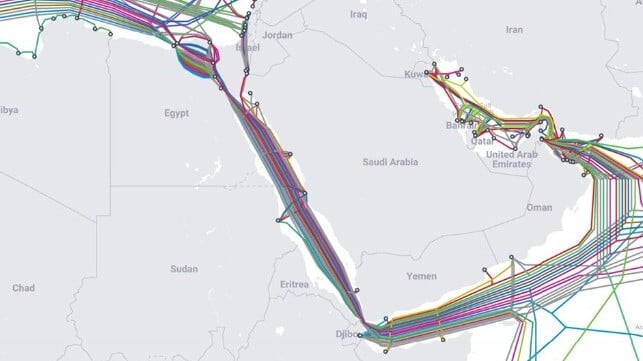Subsea Cable Cuts in Red Sea Increase Data Delays

On Saturday, Microsoft confirmed that undersea cable cuts in the Red Sea may have increased delays for customers of its Azure cloud platform. Users with data passing through the Mideast - whether locally, in Asia or in Europe - temporarily experienced higher latency.
In an update Sunday, the company said that the issues were resolved, and that its team was working to manage the effects of the situation by rerouting traffic through other channels. It cautioned that permanent repairs to the subsea links could be longer in coming.
"Undersea fiber cuts can take time to repair, as such we will continuously monitor, rebalance, and optimize routing," the software giant said.
Internet traffic monitor NetBlocks reported that the disruption was located in the Red Sea, and the Pakistan Telecommunication Company narrowed the location to waters off the coast of Jeddah - roughly 400 nautical miles northwest of Houthi-controlled areas of western Yemen, the region of highest maritime security concern in the Red Sea.
Accidental cable cuts happen routinely around the world, and private-sector commercial cable repair companies run a steady business dispatching cable ships to make repairs. The cuts attract more attention when they occur in areas of high geopolitical tension. Repeated cuts in the Taiwan Strait and the Baltic have resulted in vessel arrests and criminal charges for ship captains who are suspected of severing lines with their anchors - but proving intentional sabotage is difficult when the act of cutting a cable also occurs by accident, with frequency.

that matters most
Get the latest maritime news delivered to your inbox daily.
The most recent cable damage incident in the Red Sea occurred in early 2024. Three cables were severed in February 2024, likely cut by the dragging anchor of the stricken bulker Rubymar. The ship drifted for weeks - abandoned and unassisted - after Houthi fighters hit it with an antiship missile.
90 percent of all international data traffic passes through subsea cables, and they are essential to the smooth functioning of commerce. That makes them a tempting target for saboteurs and spies: the cables are remote, difficult to monitor, and largely unprotected, especially in deep waters where they lie unburied on the bottom. Multiple nation-states are known to possess sophisticated capabilities for tampering with, cutting or destroying subsea cables - but in shallower waters, a dragged anchor is all that is needed.
